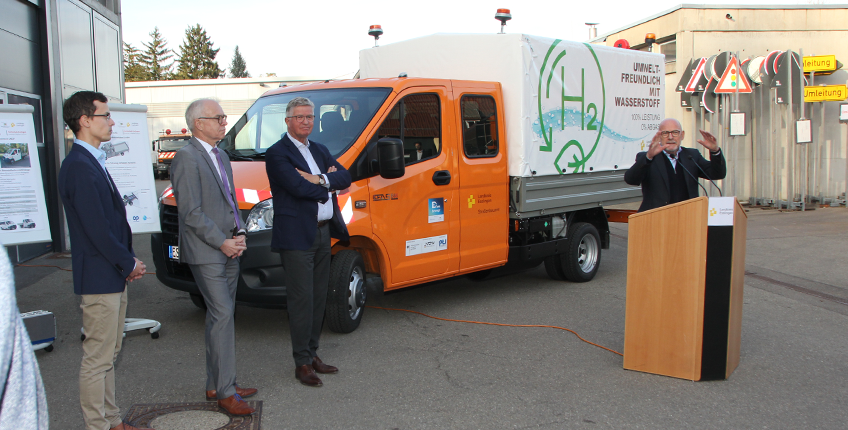The road construction office (“Straßenbauamt”) of the Esslingen district has added the first truck with a fuel cell drive train to its fleet. The vehicle was put into service on Wednesday, 19 October with a first trip in the presence of Transport Minister Winfried Hermann and District Councillors Heinz Eininger and Edgar Wolff at the Kirchheim unter Teck road maintenance depot.
The double cab, flatbed vehicle has a gross weight of 4.6 tonnes and is the first of two hydrogen such trucks to be used as a pilot series vehicle in the “Emission-free Road Maintenance Services” project (LKES² – “Emissionsfreie Straßenmeisterei”) in the district of Esslingen. The district is cooperating with the Institute for Sustainable Energy Technology and Mobility (INEM – Institut für nachhaltige Energietechnik und Mobilität) at the Esslingen University of Applied Sciences and partners from the regional economy.
“With the deployment of this vehicle, we are taking a big step towards becoming an emission-free road maintenance depot and thus making a contribution to climate protection,” says District Administrator Heinz Eininger. In road maintenance, heavy commercial vehicles often require high levels of energy in everyday use. The currently still much cheaper battery-electric drive therefore has limits in terms of range and robustness. Vehicles with a fuel cell powertrain have further advantages: by supplementing the battery-electric drive with a fuel cell and hydrogen tanks, the truck has a range of around 500 kilometres, and it is also characterised by a high degree of robustness.
“About 99 percent of heavy commercial vehicles are still diesel-powered. The potential for conversion to zero-emission vehicles is therefore enormous, especially in this vehicle sector. The use of fuel cells can close this gap. Its use makes sense especially in heavy-duty transport. That is why we as a state want to decisively promote fuel cell technology,” says State Transport Minister Hermann, who spoke of this being the dawn of a new era.
The project is part of the “H2Rivers” competition entry and was selected as the winning region in the “HyPerformer” category under the federal government’s HyLand funding programme. The project has a total volume of around 950,000 euros. The procurements are funded by the Federal Ministry of Digital and Transport (BMDV – Bundesministerium für Digitales und Verkehr) within the scope of the National Innovation Programme Hydrogen and Fuel Cell Technology with a total of 388,500 euros. The funding guideline is coordinated by NOW GmbH and implemented by Project Management Jülich (PtJ). The state of Baden-Württemberg is funding the vehicle procurements with a further 200,000 euros as part of the state initiative III Market Growth Electric Mobility (Landesinitiative III Marktwachstum Elektromobilität).
The production of the alternative powertrain commercial vehicles is characterised by a high proportion of regional value creation. The company Elektrofahrzeuge Stuttgart (EFA-S GmbH), based in Zell unter Aichelberg in the district of Göppingen, is the manufacturer. The drive concept developed by the manufacturer enables a long range in the small van segment with a permissible gross weight of 4.6 tonnes. Furthermore, the high-torque electric motor enables the vehicle to be coupled to an additional 2.5 tonne trailer. In this combination, the vehicle is the first of its kind on the vehicle market.
Following the procurement of the first battery-electric truck for the road construction office in autumn 2020, the Esslingen district is now also focusing on future technologies with its entry into hydrogen and fuel cell technology. “The pure hydrogen car was out of reach for everyone until recently. The development, the system was too expensive. Now we see hydrogen as the natural gas of the future. I am pleased that our road construction office, together with a manufacturer from the district of Göppingen, is setting a good example here,” says District Administrator Edgar Wolff.
According to experts, the advantages of this vehicle concept lie in the very good market prospects of the vehicles: They can not only be used in road maintenance depots, but also represent the classic spectrum of use of a vehicle in municipal building yards. Another advantage is that the vehicle can be refuelled at existing 700 bar hydrogen refuelling stations. To date, such filling stations are in operation nearby in the district of Wendlingen am Neckar and at the regional airport. Further filling stations where climate-neutral green hydrogen can be refuelled are already being planned in the district and will gradually become available in the coming years.
The road construction office of the Esslingen district is responsible for the districts of Esslingen and Göppingen. Maintenance (including winter service and grounds maintenance) of the entire road network of federal, state and district roads is performed by the road maintenance offices in Deizisau, Kirchheim unter Teck and Geislingen an der Steige. The first vehicle with fuel cell drive is used for road maintenance – in particular by the road marking crew.
Once the pilot vehicle has proven itself in practical operations, it will be able to begin substituting for regular replacements.
Photo: Minister of Transport Winfried Hermann (right) honours the deployment of the first fuel cell vehicle as the dawn of a new era. Image source: Esslingen District Office, Andrea Wangner


